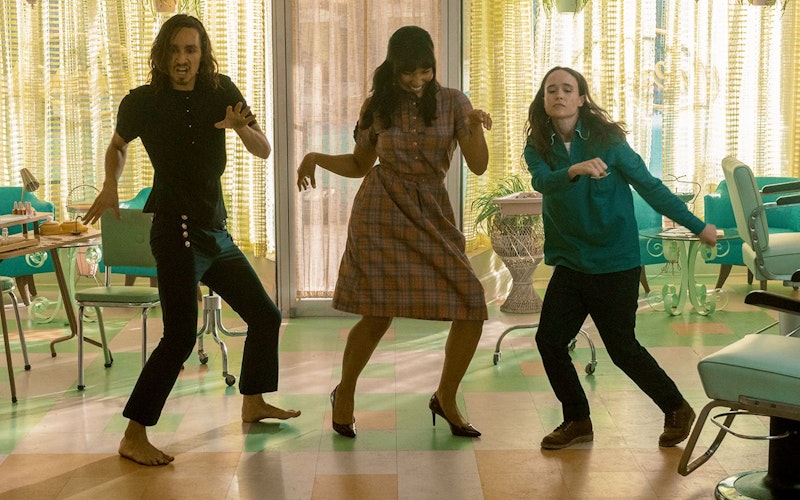
TV
The Umbrella Academy’s Apocalypse of Mercy
In some of the most thrilling scenes of Season 2 of The Umbrella Academy, the titular team of super-kids turned neurotic adults faces apocalypse.
That shouldn’t be a surprise. After all, the first season of the series, which is based on a comic book by Gerard Way and Gabriel Bá, did end with the team narrowly escaping the end of the world when time-traveling brother Five (Aidan Gallagher) whisked them back to the early 1960s.
The most exciting apocalypse this time appears in the middle of the second season. There are no exploding moons or knife-throwing vigilantes involved. Just Vanya Hargreeves (Ellen Page) sitting on a bed and asking her brother Luther (Tom Hooper), “What caused the apocalypse?”
The question immobilizes Luther, a hulking man with the literal body of a gorilla. Pain creases across his face. He searches for escape from his sister’s stare, but he finds none. A low hum rumbles on the soundtrack. Finally, he answers.
“You did.”
The Umbrella Academy may be a show in which superheroes fight time-traveling assassins dispatched by a talking goldfish, but its greatest conflicts are interpersonal. Blasting bad guys comes easily to the Hargreeves siblings; dealing with their emotions does not.
We see that struggle in Vanya’s physical response to Luther’s revelation. The camera catches her body as it constricts, pushing against the shame and disbelief engulfing her. While their adoptive father Sir Reginald Hargreeves (Colm Feore) manipulated all of his children, he treated Vanya the worst. After witnessing the vast power of her psionic blasts, Sir Reginald determined that she must be contained, not trained. With the help of pills, lies, and sister Allison’s (Emmy Raver-Lampman) mind-control powers, Sir Reginald raised Vanya to believe that she had no abilities, that she was not special, and that she must be alienated from her siblings.
The series’ first season follows the Hargreeves reconvening after Sir Reginald’s death, during which Vanya discovers her powers—only to be manipulated by a villain into using them against her family and destroying the moon. But upon arriving in the 1960s with no memory of her past, Vanya starts a new life living with Carl and Sissy Cooper (Stephen Bogaert and Marin Ireland) and caring for their autistic son Harlan (Justin Paul Kelly). Carl’s controlling ways prevent it from being a perfect life, but Vanya is not haunted by her past misdeeds—at least, not until Luther answers her question.
Blasting bad guys comes easily to the Hargreeves siblings; dealing with their emotions does not.
Revelation, as we’re often reminded by biblical scholars and pedants, is the point of apocalypse. Often associated with John’s vision in the last book of the Bible, apocalypse means “unveiling,” not “end of the world.”
Luther’s answer is an apocalypse for Vanya because it tears away the veil of amnesia that hid her terrible actions. But that's not all it reveals. Instead of giving in to anger and accusation, compassion seeps across Luther’s face, softening the rugged look of his swollen eye and split lip—remnants of a foolish fight he had earlier in the day. He tells Vanya the full context of her life. He confesses his own part in hurting and alienating her. “You had kind of a bad childhood,” he reveals.
Christians sometimes get caught up thinking about end-of-the-world revelations; what we need are more apocalypses of mercy. Rachel Held Evans described these types of experiences in her book Searching for Sunday, where she compared the church to a recovery group. She described the church as “a safe place where a bunch of struggling, imperfect people come together to speak difficult truths to one another.” When we reveal those difficult truths about our brokenness and shortcomings to each other, we get a chance to “admit to one another that we’re not OK, and then to seek healing and reconciliation together, in community.”
Evans builds her observation from a reading of James 5, which exhorts readers to pray, whether they are in trouble, happy, or sick. No matter what state we’re in, James tells us, we must “confess [our] sins to each other and pray for each other so that [we] may be healed.” Healing cannot come if we hide from one another. We only get better when we have an apocalypse of mercy.
It’s that type of apocalypse that drives one of the most heroic scenes in The Umbrella Academy. Musical sequences are a staple of the series, which uses music-video aesthetics to mirror the comic’s surreal style. Most of the time, these scenes pair a pop song with scenes of violence, to show off the characters’ powers or to ironically distance the viewer from the carnage.
But in “Valhalla,” the fifth episode of Season 2, the show’s use of music is heroically sincere. After meeting Luther and Five, Vanya reunites with siblings Allison and Klaus (Robert Sheehan). Despite the hurt that’s passed between them, neither Allison nor Klaus condemn their sister. Instead, they sit together and confess their mistakes. They sob and hug and complain. And then, they dance.
As Sam Cooke’s “Twisting the Night Away” plays, the three siblings get up and move around the room. A series of striking cuts catches the trio as they dance awkwardly, foolishly stumbling over one another. They dance unimpressively, sitting in beauty shop chairs and bouncing their feet. But they dance honestly, supporting and uplifting one another as they move.
Granted, the three-minute ditty isn’t as awesome as their derring-do against the reality-warping apocalypse that ends Season 1 or the nuclear apocalypse threatened in the Season 2 finale. But it’s an apocalypse nonetheless, one that reminds us of the heroic things that are possible when we meet hurt and alienation with forgiveness and love.
Topics: TV